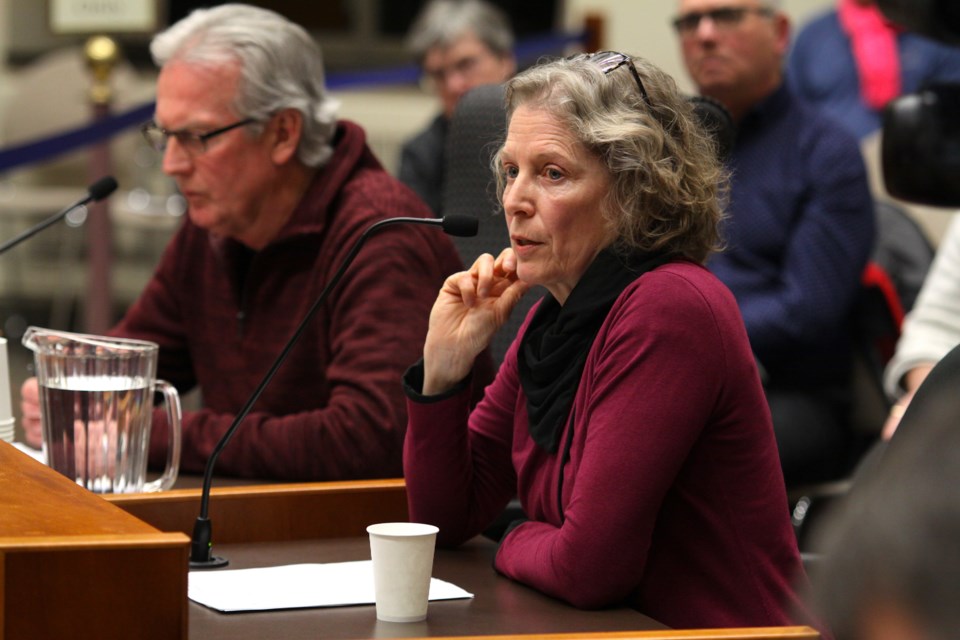THUNDER BAY – With one vocal exception, citizens urged city council to focus on investing in public services and infrastructure, rather than on cutting taxes, at a public feedback session on the proposed 2020 budget Monday night.
Many who spoke urged the city to focus on urban infill, limiting new suburban developments, expanding cycling infrastructure and walkability, and fighting climate change. Several also argued against building new infrastructure like the proposed indoor turf sports facility.
In total, council heard deputations from nine people, with some representing groups but most simply speaking as Thunder Bay citizens.
CUPE Local 87 President Dana Vacek thanked councillors for avoiding major cuts to public services. At its final budget planning meeting last week, councillors steered clear of the biggest items on a list of over $2 million in potential spending reductions they had asked city administration to prepare.
Vacek raised ongoing issues faced by members of his local, which represents hundreds of city workers. Those included increasing overtime demands for waste and recycling workers, as Vacek says the city has been slow to fill vacancies.
Representatives from the Friends of the Thunder Bay Conservatory also thanked council for holding off on cuts to that facility, and touted its importance to the community. Councillors delayed a decision on its future ahead of a report from city administration, expected in March.
Ken Shields and Andrew Brigham asked council for more action on cycling infrastructure. They called for an alternative strategy for a north/south cycling link, after the city cancelled a proposed Vickers/Carrick cycling and pedestrian bridge over the Neebing floodway. The pair suggested council make May street a community safety zone and introduce a contra-flow bike lane on the May street bridge over the floodway.
Brigham pointed out that council had declared a climate emergency the night before cancelling the Vickers/Carrick project. He says the city needs to do more to make its roads safe for cyclists, pointing to the vehicle/cyclist collision numbers he has made available to the public on his website.
Cindy Long and David Spackman focused largely on the importance of revitalizing Thunder Bay’s two downtowns in their deputation. They suggested a freeze on new developments on the outskirts of the city, which carry with them major costs to supply city services. They also encouraged council to expand efforts like traffic calming measures in the Bay-Algoma neighbourhood, to make downtown neighbourhoods more walkable and encourage urban infill. They believe that’s key if the city wants to spur growth and attract young people to live here.
Spackman said his career in the Canadian housing sector taught him cities need to adjust their approach as a new generation of home-buyers emerges.
“In the younger generation between the ages of 25 and 40, there is a much greater move to looking for a downtown urban lifestyle than a suburban lifestyle,” he said. “The traditional ‘50s and ‘60s suburbs that were built are going the same way that bricks and mortar retail are.”
They joined several others in discouraging council from cutting services to lower taxes.
“The key to controlling our tax burden is managed and responsible growth, not cutting,” Spackman said. “There’s been a number of years where all the budget discussion has been around cutting the fat. Well, you know what, at some point you’re down to the bone – and I think we’re getting there in Thunder Bay now.”
Frank Armiento echoed that sentiment.
“I would like to see new growth, because that’s what we need – not to cut services,” he said.
He asked council to stay away from major new projects like the proposed indoor turf facility. He also called the council out for failing to live up to its rhetoric on climate change.
“You guys declare a climate emergency and don’t put any money into climate change?” he challenged councillors.
Another deputant asked the city to make climate change its number one priority.
The meeting did feature one strong dissenting voice, as former mayoral candidate and frequent city hall critic Henry Wojak took council to task for failing to tackle rising tax rates.
“This council needs to get to work before they even think of ratifying the budget,” he said, urging councillors to trim an expected increase of around $5 million to last year’s tax levy.
He told council they should reject the proposed budget from Thunder Bay’s Police Services Board, which contains nearly $2 million in increased costs.
He asked council to aim for an increase of no more than $4 million to the tax levy, echoing a recommendation made by the Thunder Bay Chamber of Commerce.
Councillors asked numerous questions of those who came to share feedback. Changes can still be put forward at the budget ratification meeting next week, on Feb. 10. Citizens can learn more about the Thunder Bay budget at the city’s website.
